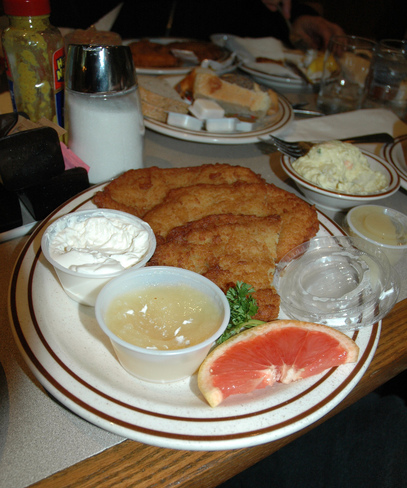Kosher Food Plays A Major Role In Jewish Faith And Culture

Similar to the practices of
Muslims and Hindus, kosher is very much important to the Jewish faith. Stemming
from their deeply-rooted beliefs about food – its preparation and consumption –
this practice of “keeping kosher” is their way of expressing their devotion to
God.
You can find at crock pot recipes for the kosher requirements of Jews in virtually every city. Not limited to butchers and fish mongers, you can also find delis and grocery stores selling kosher ingredients for slow cooker recipes and serving cooked food.
With much more to it than merely buying food from certain sources, those looking for kosher foods know how to search for the rabbinic seal – a symbol guaranteeing that the food has been prepared under the supervision of a rabbi. For a true adherence to the laws of kosher, everything; from the equipment, to the methods of slaughtering animals, to the workers who prepared the food must follow stringent requirements set forth by the Kashrut. Every country has a rabbinic association that ensures the adherence to the rules. They are the ones who check if the shops claiming to sell kosher food are really selling the real thing.
Because Jews have differing theological schools and religious traditions, the Kashrut accounts for this fact by having different degrees. Often, food shops offer essentially the same kosher foods with different packages and different rabbinic seals signifying the difference in the said degrees. Prices are different for these foods simply because some pass more stringent rules than others.
You might have encountered the term “kosher-style”. Although adhering to similar laws such as not using forbidden animals and not mixing dairy with meat, kosher-style is less stringent and not really considered kosher in the strictest sense of the word by purists and devout Jews. These are more fitting for individuals who are not practicing Jews.
All of this exacting practice is rooted on the Torah, the holy scripture of the Jewish faith. In it, it is forbidden to eat the flesh of forbidden animals and even if the animal is not forbidden, it must be prepared by way of “shechitah keshera.” The shochet, a Jewish butcher, plays a huge role in a Jewish community’s ability to eat according to kosher laws. Although the Torah allows any man to be a Jewish butcher provided a rituals is performed, in actual practice, a rabbi designates the role to a single person. A kosher meatshop is essentially kosher if the butcher is a practicing Jew. Gentiles, or non-Jews can never be kosher butchers.
The Torah details these laws and specific ways and techniques are contained therein. Subsequent interpretations by rabbis through the centuries accounted for the fact that food preservation then was practically nonexistent and that food scarcity was a very common occurrence. Much of the practice was hinged in practicality as much as religious belief. “Keeping kosher” was based on consuming foods that were also nutritionally sound. Fulfilling God’s wishes also meant consuming food that was good for you and that would take care of your health.
You can find at crock pot recipes for the kosher requirements of Jews in virtually every city. Not limited to butchers and fish mongers, you can also find delis and grocery stores selling kosher ingredients for slow cooker recipes and serving cooked food.
With much more to it than merely buying food from certain sources, those looking for kosher foods know how to search for the rabbinic seal – a symbol guaranteeing that the food has been prepared under the supervision of a rabbi. For a true adherence to the laws of kosher, everything; from the equipment, to the methods of slaughtering animals, to the workers who prepared the food must follow stringent requirements set forth by the Kashrut. Every country has a rabbinic association that ensures the adherence to the rules. They are the ones who check if the shops claiming to sell kosher food are really selling the real thing.
Because Jews have differing theological schools and religious traditions, the Kashrut accounts for this fact by having different degrees. Often, food shops offer essentially the same kosher foods with different packages and different rabbinic seals signifying the difference in the said degrees. Prices are different for these foods simply because some pass more stringent rules than others.
You might have encountered the term “kosher-style”. Although adhering to similar laws such as not using forbidden animals and not mixing dairy with meat, kosher-style is less stringent and not really considered kosher in the strictest sense of the word by purists and devout Jews. These are more fitting for individuals who are not practicing Jews.
All of this exacting practice is rooted on the Torah, the holy scripture of the Jewish faith. In it, it is forbidden to eat the flesh of forbidden animals and even if the animal is not forbidden, it must be prepared by way of “shechitah keshera.” The shochet, a Jewish butcher, plays a huge role in a Jewish community’s ability to eat according to kosher laws. Although the Torah allows any man to be a Jewish butcher provided a rituals is performed, in actual practice, a rabbi designates the role to a single person. A kosher meatshop is essentially kosher if the butcher is a practicing Jew. Gentiles, or non-Jews can never be kosher butchers.
The Torah details these laws and specific ways and techniques are contained therein. Subsequent interpretations by rabbis through the centuries accounted for the fact that food preservation then was practically nonexistent and that food scarcity was a very common occurrence. Much of the practice was hinged in practicality as much as religious belief. “Keeping kosher” was based on consuming foods that were also nutritionally sound. Fulfilling God’s wishes also meant consuming food that was good for you and that would take care of your health.
